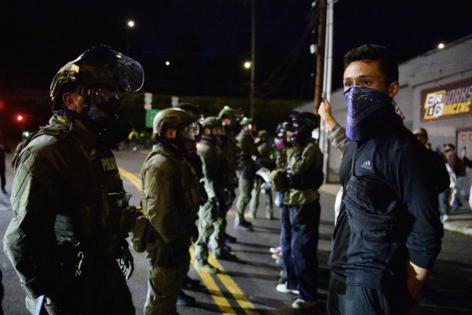Do Oregon protests need Trump's troops? Judge to rule by Sunday
Published in News & Features
A federal judge in Oregon said she’ll rule this weekend on whether President Donald Trump can legally deploy National Guard troops to Portland to quell protests outside a federal immigration facility.
During a three-day trial, U.S. District Judge Karin Immergut heard conflicting descriptions from federal and local law enforcement officials of how dangerous conditions are on the ground.
Lawyers for the city and state of Oregon argued that the federal government has “manufactured” a crisis, and are urging Immergut to declare Trump’s deployment unlawful and prohibit him from sending National Guard troops to the city.
The Trump administration claims various incidents since June — including people breaking windows and demonstrators displaying a guillotine — warrant the use of troops to protect federal personnel and property from violence because the Department of Homeland Security “cannot contain this threat itself.”
The trial, which concluded Friday, marks the biggest legal test yet for the president’s attempts to use military force in response to civilian protests in cities across the country. It comes as judges across the country are considering other legal challenges to Trump’s deployments in Los Angeles, Chicago and Washington, D.C.
While those cases have been making their way through the courts, none have yet answered whether Trump legally invoked a rarely used federal law to deploy the troops over objections from state and local officials.
Immergut directed both sides to submit additional filings to the court by noon on Saturday answering specific questions, including how they define “rebellion” and “regular forces.” Those terms appear in the statute authorizing the president to bring state troops under federal control. She said she intends to issue a ruling before a temporary order halting any deployment expires on Sunday.
Normally, state National Guard members are under control of individual governors. But Section 12406 of Title 10 of the U.S. Code allows the president to federalize those troops in the event of a rebellion against the U.S. government or an inability to enforce federal law using regular forces.
The Trump administration has argued that protests in Democratic-led cities like Portland constitute a rebellion because they are preventing federal agents from enforcing immigration law. The states and cities challenging Trump’s deployments argue that current conditions don’t qualify as a rebellion and that the president is violating the 10th amendment to the Constitution, which protects state sovereignty.
The ongoing protests in Portland have largely been held outside a U.S. Immigration and Customs Enforcement field office just south of downtown.
Leaders of the Federal Protective Service testified that the Portland police failed to respond to reports of violence, despite repeated requests for additional support.
One supervisor, identified in court only by his initials for security purposes, said officers with the federal force have been “surged” to Portland from postings across the country to deal with protesters in levels that are unsustainable. He said having National Guard soldiers at the scene would allow those federal officers to return to their regular duties.
Portland Police Bureau Commander Franz Schoening acknowledged in testimony that there was “violent, tumultuous conduct” at some moments during the protests in early June. But he said that when local officers took action, the “riotous conduct dissipated fairly quickly.”
Schoening and other Portland police officials said tensions at the protest were inflamed by what they described as “indiscriminate force” used by federal officers against protesters. They testified that some crowd control tactics can further aggravate crowds, and local law enforcement has taken a more measured approach to its response to demonstrators in recent years, following massive protests in the city in 2020 against police brutality.
In his closing argument, a lawyer for Oregon said military forces should not be used for situations that can be handled by civilian law enforcement.
“It’s no exaggeration to say that, in their debates over the Constitution, our nation’s founders were afraid of the issues that we’re debating in court today,” attorney Scott Kennedy told the judge.
Eric Hamilton, a Justice Department lawyer, countered that courts are not allowed to second-guess a president’s decision to mobilize the National Guard as he sees fit.
“We’ve seen agitators target the Portland ICE building with violence, intimidation and threats over and over again,” he said. “This is a rebellion against the authority of the United States.”
©2025 Bloomberg L.P. Visit bloomberg.com. Distributed by Tribune Content Agency, LLC.







Comments